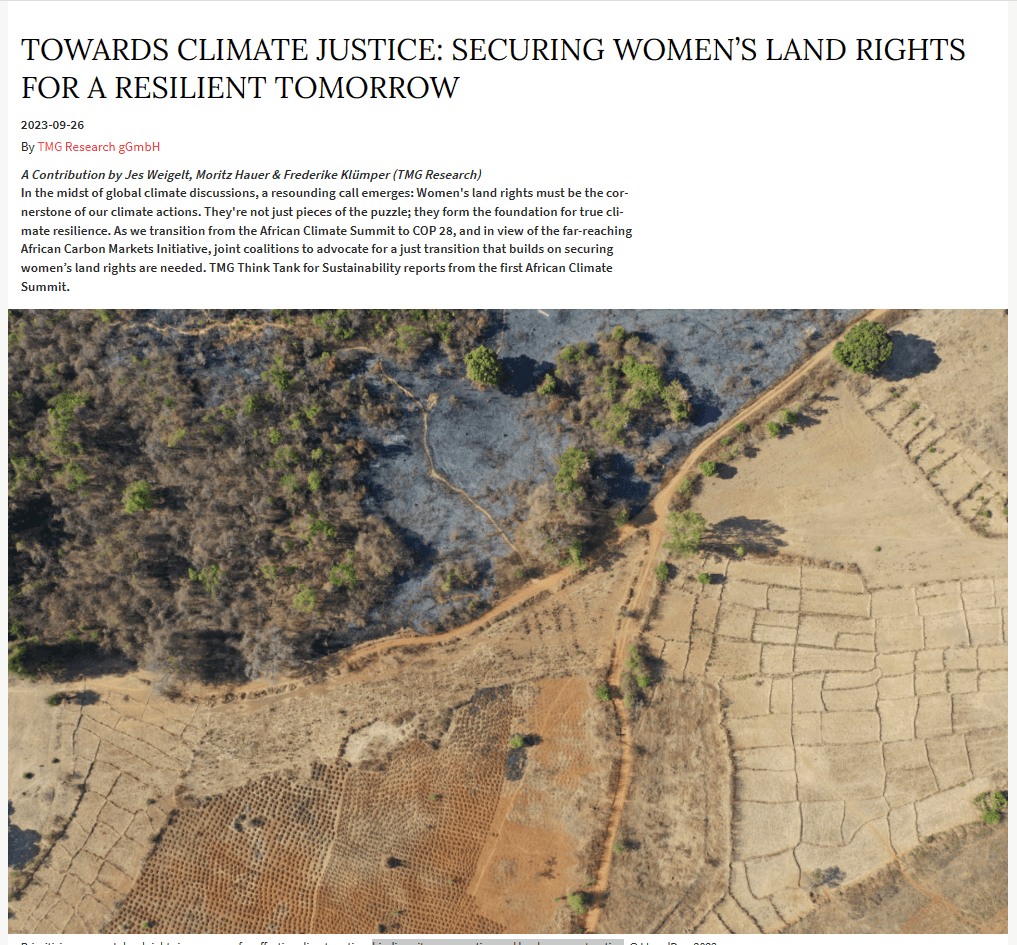A Contribution by Jes Weigelt, Moritz Hauer & Frederike Klümper (TMG Research)
Land Rights and Gender Responsive Climate Action Seminar
“The Africa Climate Summit, Week, and the People’s March talk about big global issues. Here, we concentrate on something embedded in these big issues: land rights.” – Alexander Müller, Managing Director TMG Research
One notably missing topic during the Summit’s discussions on climate action, carbon markets, and green growth was land tenure rights, especially women’s land rights. To address this, TMG Research organized a seminar on Land Rights and Gender Responsive Climate Action bringing together diverse perspectives from community voices to National Focal Points perspectives and representatives from the Rio Conventions’ Secretariats, building on outcomes of the Strategy Workshop on Women's Land Rights and the Rio Conventions. The seminar's message was clear: Effective climate action, biodiversity conservation, and land restoration demand prioritizing women's land rights.
The UNCCD landmark Land Tenure Decision (Decision 26/COP14) was highlighted as a critical instrument to also secure women’s land rights in climate actions. So far, UNCCD’s land tenure decisions are the only decisions that link the global gold standard on responsible land governance – the tenure guidelines adopted by the UN Committee on World Food Security (VGGT) – to a Rio Convention. Their potential for achieving just transitions was highlighted at the last UNCCD COP 15 in Abidjan. At a time when women’s land rights are under threat for a multitude of reasons, it requires coordination and alignment between the Rio Conventions to overcome the barriers that inhibit just transitions from materializing.
Grassroots Women and Climate Impact
Highlighting the multifaceted roles that grassroots women perform, such as caring for and nourishing their families and communities, participants illustrated the severe consequences of climate change impacts on women and their communities. Insecure land tenure can leave women vulnerable to displacement when climate-induced disasters strike, jeopardizing not only their access to food but also their homes. Empowering women in rural communities, promoting gender equality, and prioritizing women's access to land and productive resources are essential for effective climate action, exemplified by Violet Shivutse from Shibuye Community Health Workers in Kenya.
Carbon Credits or Pollution Permits?
Several participants raised concerns about the Summit’s heavy focus on carbon markets and green growth, and how the global discourse appears skewed in favor of those countries heavily contributing to global warming. Polluting countries use Africa as a platform to compensate for their emissions through carbon credit schemes while providing inadequate compensation and insufficient financial contributions for climate change mitigation and adaptation. Safeguards are needed to protect women's land rights in carbon market initiatives, supported through tools, such as the Haki Ardhi Rights Reporting Tool, developed by Kenya Land Alliance, TMG Research, and Rainforest Foundation UK.
“I feel that there is a lack of understanding of how all the proposals around carbon markets are actually resting on land; and yet, nobody is talking about whose land this is.” – Esther Mwaura-Muiru Global Advocacy Director, Stand for Her Land Campaign
A ‘Whole-of-Society’ Approach to Progressively Realize Women’s Land Rights
The discussions highlighted that successful land rights policies require addressing deeply rooted social norms that uphold gender inequalities regarding land ownership. Cultural systems and local traditions might hinder the operationalization of fair and equitable land policies, requiring a deeper understanding of cultural contexts that shape land tenure perceptions and calls for awareness raising, open dialogues, and local alliances. In addition to holding Government accountable to their human rights obligations, a whole-of-society approach was recommended to secure women’s land rights, changing social norms, enabling community-led decision-making on land use, and driving investments in land restoration and local climate action, with governments, citizens, and cultural leaders collaborating to address land tenure issues and ensure no discrimination.
“Restoration of degraded land means investing in that land, and investment can only happen when there are clear rights in terms of who is going to benefit.” – Teddie Kamoto, UNCCD National Focal Point, Malawi
From Africa Climate Summit to COP 28
Many attendees felt that the Summit did not sufficiently address marginalized communities' concerns and voices, expressing a heartfelt wish to see rural women included in these dialogues. As the global community approaches COP 28, participants emphasized that Global South nations must champion land rights in climate action, calling for an authentic African-led vision that taps into the continent's vast potential for renewable energy resources, land restoration, and biodiversity conservation while safeguarding secure land tenure rights. The way forward demands coherence and conscious efforts to ensure inclusivity. As discussions on the global stage progress, grassroots solutions, predominantly led by women, must inform the negotiations. The results of the negotiations must contribute to creating an enabling environment for those grassroots solutions to flourish and sustain.
In summary, land rights are not just a piece of the puzzle; they are a foundation to achieve just transitions. This also implies joining forces and building coalitions. Climate action requires a rights-based, just, and equitable approach with robust environmental and social safeguards, necessitating an unwavering commitment to mainstream the perspectives of communities and the most vulnerable to create a sustainable future for all.

